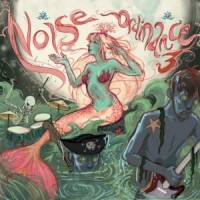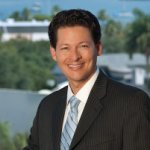Politically Personal: What’s with all the noise? (10/19/12)

This article originally appeared on PoliticallyPersonal.com (Oct. 19, 2012).
Aside from learning why the under 40 crowd thinks it’s high time Sarasota reforms its current noise ordinance, City Commissioner Paul Caragiulo’s takeaway from Wednesday’s community workshop at City Hall Annex should be that if you advertise it, they will come. “I’m absolutely ecstatic we have so many people here. It’s terrific. I wasn’t expecting that,” Caragiulo said to the crowd of nearly forty young professionals, musicians, condo residents and representatives of downtown civic associations.
“It’s exciting to see faces I’ve never seen before. I don’t know a lot of you and that’s a good thing,” he continued.
Caragiulo wasn’t alone. Many in the audience were civic first-timers who learned of the workshop from Anthony Paull, a blogger for This Week In Sarasota who recently, through a series of articles, began making a lot of “noise” of his own over noise issues downtown.
“This city is dying and I think that everybody in here needs to realize that. Downtown is dying,” Paull would later tell meeting-goers during public comment.
HOW LOUD IS TOO LOUD?
Before citizens were invited to speak, Caragiulo took a few minutes to explain exactly what the city’s current noise ordinance entails.
In short, the city’s downtown core ordinance regulates outdoor amplified sound and bans it between the hours of 11 p.m. – 7 a.m. on weekdays and 11:59 p.m. – 7 a.m. on Saturday and Sunday nights and nights before a federal holiday. (Mattison’s City Grille is exempted).
When bands plays, the sound must be lower than 65 dBA, 70 dBC, which is not much louder than the sound of a hair dryer.
Caragiulo played a sample track of music at 70 dBC to demonstate what violating music sounds like to the naked ear before joking with HuB founder Rich Swier Jr. that his voice would be in violation.
“You actually hit 70,” Caragiulo said to Swier as he was speaking into a microphone.
Caragiulo also indicated that noise complaints are relatively rare. He noted that there were only 262 noise complaints and 29 noise-related citations issued in 2011, some of which may have been complaints about barking dogs and loud arguments in addition to music. In the downtown zone, he said, there were only 20 complaints and 2 citations in 2011.
BRING ON THE NOISE
A majority of the people who attended Wedneday’s workshop spoke in favor of modifying the current noise regulations and gave suggestions for how to do so.
Shannon Fortner and Claire Franklin have both been performing live music in Sarasota for over two decades combined. Fortner’s band used to play at Alley Cat and Esca before the venues closed, and she remembers getting noise complaints.
“I think at Esca that was a big issue with them because the whole draw that they had was really from live music,” said Fortner.
She believes noise complaints contributed to Esca’s failing and the failing of numerous other venues that have tried to bring live music to downtown.
“Over the past ten years, there hasn’t been that many live music venues because of the situation with the noise ordinance. People don’t want to deal with getting citations, getting everything set up to have live music and then being shut down,” she explained.
Franklin pointed out that part of the problem is that noise complaints can currently be made anonymously, which affords competing businesses an opportunity to call in false complaints on their competitors.
“If the policy is switched to a source of complaint, then they have to know where the person is and who the person is that is making the complaint. That eliminates that issue,” she argued.
Rich Swier Jr. of the HuB, asked Commissioners to focus to the economic impact the regulations are having.
“The thing that I think is missing in this argument, or maybe it’s somewhat muffled, is that this is an economic argument,” said Swier.
The real challenge, he argues, is to find a way to create an economy that allows for a vibrant nightlife, draws in young professionals and gives artists and musicians ample opportunities to make a living without infringing on the rights of downtown residential property owners.
Steve McAllister, a Sarasota native, remembers a time when downtown Sarasota was vibrant and there were no noise ordinances to contend with. “You go downtown now at 11 o’clock and it looks like a retirement village.”
“Sarasota has historically been known as the Fountain of Youth, and what people need to understand is that youth means that we celebrate. We create music and art and we’re vibrant – and we don’t want to go bed at 10 o’clock.”
Capt. Wayne Genthner argues that neither do tourists, who are quick to compliment Sarasota for its natural beauty and friendly disposition but even more quick to complain about having little to do in downtown after dark.
“I got to give them a really, really good fishing trip to make sure they do come back,” he said.
Genthner pointed to the success of places like Tampa, Orlando and Raleigh, NC, where he said officials have created arts and entertainment “zones” near the urban core — such as Ybor Centro and Channelside. He suggested Sarasota consider doing the same.
Brian Hadley, who works for the Players Theater, suggested the city consider incentives for businesses and developers who include sound buffering in their building design, citing poor construction as the reason many downtown residents are bothered by the sound.
Turner Moore believes that when noise complaints come in they should be measured at the source of the complaint, not the source of the music itself. He also wants to see a clearer distinction made between amplified music and acoustic music, pointing to the fact that both the piano and drums are not amplified instruments but capable of creating offending noise.
Rachel Denton and Frank Maggio, both representatives of the Sarasota Young Professionals Group, said the City needs to focus on retaining young people by any means. The current noise ordinances, they say, are constraining.
“[Young people] go to New College, they go to Ringling and they don’t stay here,” said Denton, who also works as the district aide for State Representative Ray Pilon. “There are statistics — they leave.”
Denton said she also wants to break the stigma that young people are nothing but a bunch of partiers, explaining that they really just seek a vibrant downtown where they can get together and socialize with friends.
Ben Thurmond, a security specialist and member of the local band The Send Offs, echoed Denton’s assertion that Sarasota is at risk of losing its youth. “I don’t want to leave, but I see an expiration date on my citizenship here just because of my limited opportunities as a musician,” he complained.
Anthony Paull of This Week In Sarasota expressed his disappointment over the fact that Sarasota’s downtown Starbucks closes at 9 pm because he claims it sees no benefit to staying open later. “It’s unacceptable. We have our midtown Starbucks closing at 1 am, and our downtown closes at 9 pm? It’s pathetic, ok. The city has become pathetic and people are afraid to voice their opinion and I am not,” he said.
“I’m not going to raise a flag and say ‘I love downtown’ because I don’t love downtown,” he continued. “It’s sad because it could be so much better and I think that, unfortunately, businesses do not want to open here because they see all the problems they have.”
PIPE DOWN, OVER THERE
Not everyone who spoke during Wednesday’s workshop was in favor of overhauling the current noise regulations. However, most seemed to agree that there was room for improvement.
Peter Fanning of the Downtown Sarasota Condominium Association, which represents roughly 4,000 residents, explained that his organization was successful in amending the noise ordinance in 2010 by reaching a compromise with condo owners and local businesses. The compromise, however, came with several caveats. Namely, that the ordinance remain exclusive to the downtown core in areas along Main Street.
“Many people in our association bought in residential areas expecting it to be like residential areas,” he said, “but I think we can reach a compromise.”
An unnamed resident of the Savoy on Palm Condominium says that while she understands the needs of Sarasota’s youth, she doesn’t feel current noise ordinances are too restrictive.
“We’re from Chicago, and believe it or not, the sound ordinance in the City of Chicago is 10 pm,” she stated.
However, she recognized that riffs are created within the community when police are forced to enforce downtown noise ordinances.
“Everybody’s mad at everybody else, and that’s not a good sign for the future of Sarasota,” she said, which is why she too would be willing to accept a compromise.
Morton Seigel, a member of the Sarasota Planning board and litigation attorney whose clients include Hard Rock Café, Playboy, Let Us Entertain You and similar entertainment venues, argued that before the commission do anything, it first identify its long-term vision for downtown Sarasota. “If the folks who have testified here are advocating that every area in downtown Sarasota should be able to have nighttime entertainment with sound, you will never see it happen,” Siegal said. “It has never happened anywhere in the United States.”
“Loud sound is going to lose if it competes with peoples way of living,” Siegel argued.
Casey Colburn, a land use attorney with Kirk-Pinkerton and chairman of the Downtown Sarasota Alliance (DSA) Civic Issues Committee, remembers tackling the noise ordinance at the county level many years ago when he was a member of the Young Professionals Group. He was excited when he heard it was back on the table because “this issue of sound and noise and the conflict that surrounds it is something that would come before my committee.”
Colburn encouraged people to work with the DSA and condo owners in arriving at a solution. “This is an issue that we can get some consensus on, and you can get some agreement on, if we all get in the same room,” he said.
He also sympathized with the speakers before him who felt their opportunities were limited in Sarasota because of current noise regulations. “I have a picture in my office of the first board of the Young Professionals Group,” he added, “and it makes me a little sad because half of the people in that group left — and they didn’t leave because they wanted to leave Sarasota, they left because they had to leave Sarasota to either achieve their career goals or survive financially.”
Finally, he emphasized the importance of staying involved in the political process, noting that “government is run by the people that show up.”
WHERE DO WE GO FROM HERE?
After everyone had been given a chance to speak, Commissioner Caragiulo said that he agreed there should be some “geographical adjustment” to where the ordinance is applied, but that he doesn’t currently have a firm solution in mind.
He suggested futher cooperation with the DSA and Downtown Sarasota Condo Association and reiterated Colburn’s comment about showing up to commission meetings.
“Casey’s absolutely right, you have to show up if you want things to change,” he said. “There is strength in numbers, especially with city policy.”



